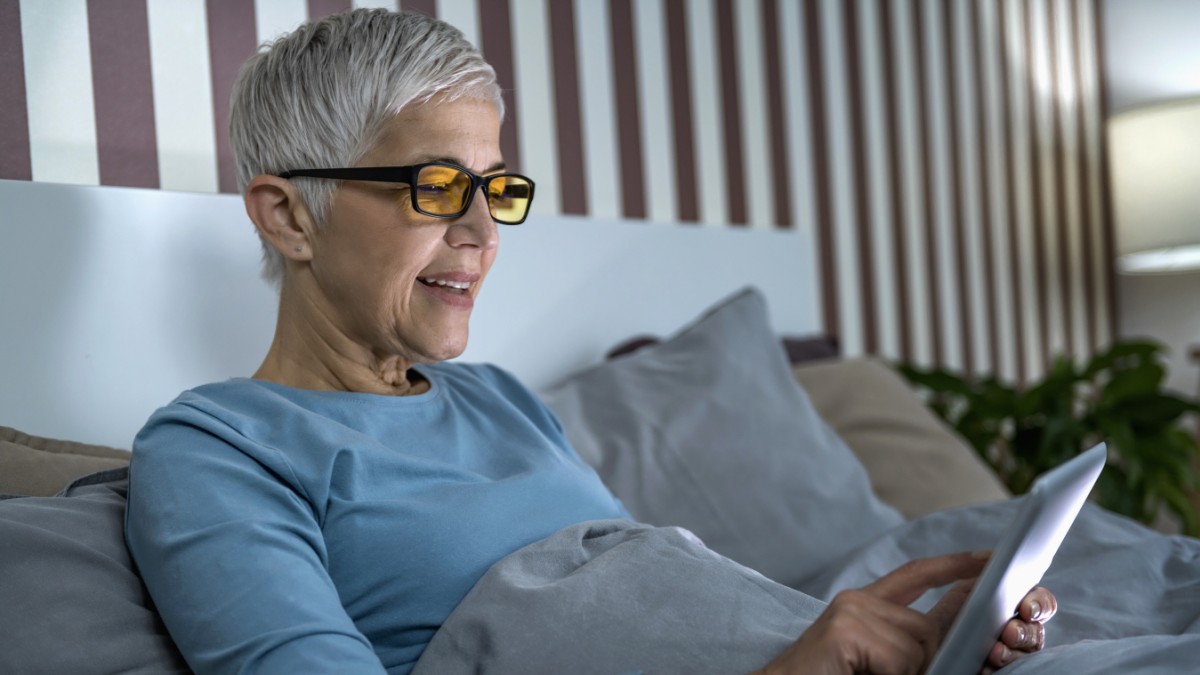They have been available for a number of years: Blue light filter glasses are designed to protect the eyes from the blue light emitted by monitors and displays when using computers, tablets and smartphones. This light is also part of natural sunlight. However, lens manufacturers claim that as we move into digital LED devices, we are more exposed to light, which has consequences for eye health and sleep patterns. However, an overview of the well-known research network Cochrane now comes to the conclusion: Glasses with a blue light filter probably make no difference to the strain on the eyes. They probably have just as little influence on the quality of sleep and the health of the retina. This does not surprise a German expert.
An international research group led by Laura Downie and Sumeer Singh from the University of Melbourne has scrutinized some of the claims. The team studied the effects of glasses with blue light filters compared to lenses without such filters on eye strain, retinal protection and improving sleep quality. To do this, it evaluated data from 17 controlled studies from six countries. The studies had between five and 156 participants and ran for up to five weeks.
In terms of eye fatigue from computer use, the analysis found no short-term benefits from the blue light filters, at least. “It is also currently unclear whether these lenses affect vision quality or sleep-related outcomes,” Downie said in a statement. As a result, the team could not draw any conclusions about possible long-term effects on retinal health. That’s something people should consider before buying glasses like this, Downie said.
These results do not surprise Michael Bach from the University Hospital Freiburg. The vision researcher has been dealing with the supposed advantages of blue light filters for a long time and writes about “blue nonsense” in his blog. The authors of the Cochrane study point to a rather poor data situation and emphasize that due to the short follow-up period of the studies, no statements can be made about long-term results. Here larger and longer studies would be necessary, they write.
The blue light is less critical than the continuous staring
Bach doesn’t see this need: “The amount of blue light that comes from the screen is ridiculously small compared to what you get outside on a sunny day. And that’s what the eye is built for.” In addition, blue light is not much more effective than other colors of light – even long-term studies would not change these biological facts.
But there is a strain on the eyes, for example from computers, emphasizes Bach. Looking in the same direction or distance for a long time can result in poor blinking, which can lead to dry eyes. So if you work in front of the screen for a long time, you should look into the distance for five minutes at least once an hour or get up and move every half hour.
With regard to the consequences of blue light for sleep, Bach explains that the main thing is to avoid brightness before falling asleep. But here, too, the difference between blue light and other light colors is relatively small. “All of these tips sound trivial, but they are correct,” says the expert, who is a member of the German Ophthalmological Society (DOG).
The Cochrane authors also go into the side effects of blue light filters: the fact that people sometimes complain about discomfort when wearing glasses, headaches and poor mood are probably related to wearing glasses in general. Such side effects would also be observed with glasses without a blue light filter.
Bach adds that such lenses changed the way color was judged – something that could be important for graphic designers, for example. In addition, an influence on the mood is at least conceivable, since the filters let less light through. “This could possibly be of importance for people who are prone to depression.”
